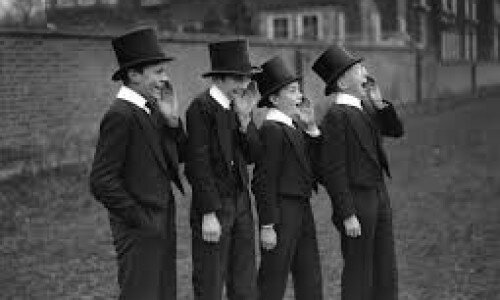
Public school and Oxbridge types still running ‘elitist’ Britain, study says
Almost half a century has passed since the great Peter Cook played the role of a coal miner who complained that what he had really wanted to be in life was a judge, “but I never had the Latin for judgin’”.
The message behind the Beyond the Fringe sketch was clear enough: for all of the talk in the swinging sixties about a meritocracy, Britain was still in the grip of an elitist public school-educated establishment.
Roll the clock on 50 years and ask how much has changed?
Not much, according to research by the Social Mobility and Child Poverty Commission, whose latest report – Elitist Britain – details the huge over-representation in parliament, boardrooms, the media and other institutions of the well-heeled and privately educated.
The statistics are astonishing: 71 per cent of senior judges, 62 per cent of senior armed forces officers, 55 per cent of Permanent Secretaries, 53 per cent of senior diplomats, 50 per cent of members of the House of Lords, 45 per cent of public body chairs, 44 per cent of the Sunday Times Rich List, 43 per cent of newspaper columnists, 36 per cent of the Cabinet, 35 per cent of the national rugby team, 33 per cent of MPs, 33 per cent of the England cricket team, 26 per cent of BBC executives and 22 per cent of the Shadow Cabinet attended independent schools – compared to seven per cent of the public as a whole.
There’s an even starker contrast when the matter of getting to Oxbridge is concerned.
Less than one per cent of school leavers in this country go on to Oxford or Cambridge. The percentage for senior judges is 75, while 59 per cent of the Cabinet, 57 per cent of Permanent Secretaries, 50 per cent of diplomats, 47 per cent of newspaper columnists, 44 per cent of public body chairs, 38 per cent of members of the House of Lords, 33 per cent of BBC executives, 33 per cent of the Shadow Cabinet and 24 per cent of MPs went to Oxbridge.
Attending an independent school clearly gives young people an advantage. Some seven per cent of children in this country are privately educated, against 88 per cent at comprehensive schools.
A third of MPs went to independent schools, 24 per cent were at Oxbridge and 54 per cent attended the elite Russell Group of universities.
And it would be wise to dispel the myth that elitism is found solely in the Conservative Party.
Twenty per cent of the current crop of Labour MPs was privately educated, while almost a quarter of the shadow cabinet attended independent schools. Some 41 per cent of Liberal Democrat MPs went to independent schools, not far short of the 52 per cent score for Tory MPs.
A third of Conservatives, a fifth of Labour MPs and a quarter of Liberal Democrats were at Oxbridge.
The proportion of privately educated MPs has fallen gradually since the 1950s, largely due to an increase in the numbers of state-educated Tory and Liberal MPs. Intriguingly, the percentage of private school Labour MPs has remained around the 20 per cent mark since 1951.
The top end of the British media is still dominated by public schools, according to the research.
More than two in five (43%) of newspaper columnists were educated privately while 54 per cent of the UK’s top media professionals – editors, columnists and broadcasters – attended independent schools.
Alan Milburn, the former Labour cabinet minister, who now chairs the Social Mobility and Child Poverty Commission, said the new research examined the backgrounds of 4,000 leaders in politics, the media, business and other aspects of public life.
Mr Milburn said: “This research highlights a dramatic over-representation of those educated at independent schools and Oxbridge across the institutions that have such a profound influence on what happens in our country. It suggests that Britain is deeply elitist.
“Locking out a diversity of talents and experiences makes Britain’s leading institutions less informed, less representative and, ultimately, less credible than they should be.
“Our research shows it is entirely possible for politicians to rely on advisers to advise, civil servants to devise policy solutions and journalists to report on their actions having all studied the same courses at the same universities, having read the same books, heard the same lectures and even being taught by the same tutors.”
Similar Articles
Firms battle for £12 billion rail contracts as MPs overwhelmingly back HS2 5
Nine consortia are competing to build the London to Birmingham HS2 high speed rail route. Major
Farron launches Birmingham Liberal Democrats election fightback 8
Liberal Democrats began a fightback in Birmingham today with party leader Tim Farron on hand
PCC tells agencies ‘get your act together’ to prevent repeat of M6 closure chaos 2
West Midlands Police Commissioner David Jamieson has told public agencies they must co-operate and work
Birmingham museums board trustees resign following row with council 20
Four members of the Birmingham Museums Trust board have resigned following a dispute with the
Dale’s Diary: Clancy gets tetchy and the Department for Rubbish Statistics 10
John Clancy gave every sign of not really wishing to be at a Birmingham cabinet










